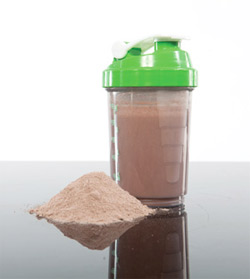The main effects of whey on muscle/strength are:
Building Blocks: It provides protein and amino acids, which serve as building blocks for increased muscle growth.
Hormones: It increases release of anabolic hormones that can stimulate muscle growth, such as Insulin.
Leucine: It is high in the amino acid Leucine, which is known to stimulate muscle protein synthesis at the molecular and genetic level.
Fast Absorption: Whey protein is absorbed and utilized very quickly compared to other types of protein.

Whey protein has been shown to be particularly effective at increasing muscle growth when consumed right before, after or during a workout, but muscle protein synthesis is usually maximized in the time period after training. However, a recent review of the evidence concluded that total daily protein intake is the most relevant factor in muscle growth. Whether protein is consumed around the workout or not doesn’t seem to matter much.
When compared to other types of protein, such as soy protein, whey protein has usually performed slightly better. When compared to casein, the evidence is more mixed. Whey appears to be effective in the short-term, but casein stimulates muscle growth over a longer period, so the net effect appears to be similar.
However… keep in mind that unless your diet is already lacking in protein, supplementing with whey protein is unlikely to have a huge effect on your results. In a study of elderly individuals who were already eating adequate protein, there was no difference in muscle growth between whey and carbohydrate, during 12 weeks of resistance training.
Therefore, the evidence of whey protein on muscle and strength is mixed, and the results may vary greatly between individuals. If you’re already eating plenty of meat, fish, eggs and dairy (also high in quality protein), then the benefits of adding whey will probably be minimal.
It is well known that protein can help with weight loss. It is the most fulfilling macronutrient, by far. Protein can boost metabolism by 80 to 100 calories per day, and make people automatically eat up to 441 fewer calories per day. In one study, eating protein at 25% of calories cut cravings by 60%, and reduced the desire for late-time snacking by half.
Taking whey protein is a great way to increase your protein intake, which should have major benefits for weight loss. Studies have shown that replacing other sources of calories with whey protein, combined with weight lifting, can cause weight loss of about 8 pounds, while increasing lean muscle mass. Therefore… if you’re trying to lose weight, then a whey protein supplement can help you both lose weight and hold on to your precious muscle.
Other health benefits of Whey Protein help protect against cancer, reduce symptoms of hepatitis, increase bone mineral density, improve immune function in HIV patients and increase lifespan in mice.
Casein Protein
 Casein protein powder is simply the dehydrated, supplemental form of casein. Caseins are phosphorus-containing proteins and make up 80 percent of the protein in cow’s milk (the other 20 percent of protein is made up of whey proteins). “So even though cow’s milk contains both casein and whey, casein is often called milk protein”.
Casein protein powder is simply the dehydrated, supplemental form of casein. Caseins are phosphorus-containing proteins and make up 80 percent of the protein in cow’s milk (the other 20 percent of protein is made up of whey proteins). “So even though cow’s milk contains both casein and whey, casein is often called milk protein”.
A study performed at Baylor University, found that men who drank a casein protein shake (blended with whey) for 10 weeks gained significantly more muscle mass than the subjects who consumed a whey protein shake without casein.
Health Benefits of Casein Protein Shakes
Casein is one of the best high quality sources of protein available. Casein’s greatest strength is timing. Casein has the ability to provide your bloodstream with a slow and steady flow of amino acids that could last for hours. Muscles may not be built overnight, but drinking a glass of casein-rich milk is the ideal protein to consume right before bed, as it’ll be more helpful throughout the night than any other protein option.
Greater Muscle Retention
Whenever you’re going on a lower calorie diet, one of the first issues that will become a growing concern is lean muscle mass loss. Since you will not be supplying enough calories to fully support all the energy needs required throughout the day, you’re forcing your body to turn to stored body tissues for energy.
In the best case scenario this will come from your body fat tissue, and in the worst case scenario the body will tap into your muscle for energy. Typically on the average weight loss diet it’s a mix of both.
One study performed out of Boston tested the variations in lean muscle mass gains as well as total fat loss when subjects either took casein protein hydrolysate in comparison with a whey protein hydrolysate, while also eating a hypocalorie diet and performing resistance training.
While both groups did show fat loss, the group using the casein protein showed greater mean fat loss and higher increases in strength for the chest, shoulders, and legs.
In addition to this, it was also noted that the casein group came out of the study with a higher total body percentage of lean mass compared with their previous measure. This indicates a greater lean body retention rate, demonstrating casein to be especially effective at maintaining muscle.
It also should be mentioned that both protein groups did bump their protein intake up to 1.5 per kilogram of body weight per day, so that must be in place for any of these factors to come into play. If you aren’t taking enough protein in during a diet, it won’t make a difference what form you’re using, you will still lose muscle tissue.
According to a Texas study, casein may be an important ingredient to your success. Researchers took 36 males performing heavy resistance training and found that the group consuming a whey and casein combination significantly outperformed participants who were given a combination of whey, BCAAs, and glutamine supplement. Over the course of the 10-week study, the whey and casein combo yielded the greatest increases in lean, fat-free mass.
Greater Fat Loss
Since casein protein is a form of protein that is higher in calcium content that also proves to be a benefit in terms of total fat loss. Many individuals are quick to turn away from dairy products while attempting to lose body fat because they feel it will slow them down.
This is completely opposite from the truth. One study that was conducted by the International Journal of Obesity observed that those who combined a high calcium intake over a twenty four hour period with a normal protein intake showed increased fecal fat and energy excretion for that day of approximately 350 kJ greater than those who either took in a low calcium, normal protein intake or those who consumed a high protein, high calcium intake.
This study makes mention of the importance of total protein intake with this factor, stating that it appears as though moderate levels of protein create this effect with the calcium greater than very high protein intakes do.
It appears from this research then that it’s best to find a good balance between calcium and protein intake, rather than just increasing protein up higher to promote fat loss.
Casein protein powder will help you accomplish both goals of having a higher calcium intake as well as boosting your protein intake, allowing you to maximize your fat loss benefits.
A study conducted in the Netherlands found that by multiplying casein intake by two and a half times, participants were able to have a higher metabolic rate while sleeping and a better overall fat balance. Also of note is that satiety levels were 33% higher. In other words, by taking casein you’ll not only be increasing your odds of losing fat, but you’ll do so on a fuller stomach.

Helps Promote Colon Health
Another very important benefit of casein protein powder is that it helps promote colon health. In a study performed out of Australia, researchers investigated the health benefits of various proteins and found that dairy proteins promote colon health better than meat and soy. This proves to be yet another reason why you should strongly consider adding casein protein to your daily intake.
Higher Quality of Protein
Finally, the last benefit you’ll receive by introducing casein protein into your diet is that of it being one of the best high quality sources of protein available. While meeting your minimum protein requirements is always top priority, if you’re taking in high quality sources of protein to meet these requirements less will be excreted by the body and you’ll need less overall to maintain lean muscle mass.
If you were taking in lower quality sources of protein and just meeting your recommended minimum requirements, this will negatively impact you because if not all of that protein is absorbed, you then will not actually be meeting those minimum requirements.
In one study published by the Journal of Nutrition researchers did note that casein protein is especially of a higher quality when compared to soy, making it an important source of protein to be getting. If you happen to be following a vegetarian diet where meat is limited (another high quality source of protein), then adding in casein if you’re okay with dairy products will be your next best bet.
Greater Strength
In a Massachusetts study, researchers found that casein actually doubled the effect that whey protein had on legs, chest, and shoulder strength results. Researchers believe the reason for the significant difference was because of casein’s well-known anti-catabolic abilities. The next time you’re thinking of having a late-night snack, make it a casein shake.
Dental Protection
According to a study conducted in the United Kingdom, one way to help prevent a more expensive dental visit might be to consume casein. Their research found that casein proteins have the potential to reduce or prevent the effects of enamel erosion. So if you drink a lot of fruit juices, or just can’t kick the soft drink habit, at least consider protecting your teeth by adding some casein protein to your diet.
Optimum Quantity of Protein Intake
- Recreational athletes need 0.5-0.75 grams of protein daily for every per pound of body weight
- Competitive athletes need 0.6-0.9 grams per pound
- Teenage athletes need 0.8-0.9 grams per pound
- Athletes building muscle mass need 0.7-0.9 grams per pound
- The maximum amount of protein that most adults can use per day is 0.9 grams per pound of body weight.
So if you’re an adult athlete who wants to build muscle mass, and you weigh about 175 pounds, the most protein you would need per day is 157.5 grams. That sounds like a lot, but one 4-ounce hamburger contains 30 grams of protein, 6 ounces of tuna has 40 grams, and a single ounce of cheddar cheese has 7 grams.
How to Use Protein Powders
If you calculate your protein intake and determine that you’re not getting enough for your athletic needs (some signs of too-low protein intake: you’re unusually fatigued, feel weak when lifting weights or doing other strenuous activity, or are recovering from injuries slowly) how can you best use protein powders to help you improve your performance?
First, ignore the conventional wisdom, which says to take protein powders immediately after a workout. “Before, during, and after a workout, carbs are what your body needs. They’re what your body uses for fuel, and what your muscles run on,” says Lewin. “Yes, protein is also important for recovery after a workout, but research shows that at that point, the body needs fuel with a 4-1 or 5-1 ratio of carbs to protein.” Since most protein powders have at least 20 grams of protein per scoop, you’d need about 80 grams of carbs to go with that scoop to get the proper proportion of nutrients!
For a better “recovery drink” after a workout, Lewin recommends a fruit smoothie with yogurt or milk, or, surprisingly, chocolate milk. “A glass of chocolate milk is one of the best things for recovery,” she says. So when should you use protein powders, if you’ve determined you need them to get more protein in your diet? Throughout the day as a snack or meal replacement, says Lewin, but not in the immediate time period surrounding your workouts. And don’t forget, says Conn: “Protein powders are not really necessary if you have access to a normal, healthy diet.”
Side Effects of Protein Shakes
Protein drinks, consumed in moderation, can make up a part of a healthy and balanced diet. In addition to protein, the shakes typically provide a source of carbohydrates, vitamins and minerals to provide health and nutrition. However, consuming protein shakes regularly, especially as a meal replacement, may lead to negative side effects. Specifically, excessive protein consumption from protein shakes may have negative effects on your kidneys.
One potential side effect of excess protein from overusing protein drinks is an increased risk of kidney stones. The stones develop from crystallization of compounds within the kidney, and they may block the tubules within the kidney, or even block the ureter — the tube that carries urine from the kidneys to the bladder. While some kidney stones may be asymptomatic, stones in the ureter can prove both painful and harmful. The University of Maryland Medical Center explains that protein intake can play a role in kidney stone formation, and reducing protein intake can reduce your risk of kidney stones. By consuming protein shakes in moderation, you can help keep your protein intake within a normal range and avoid kidney stones.
Another side effect of protein shakes, if over-consumed, is kidney strain. The kidneys filter a number of chemicals, including proteins, to ensure that beneficial chemicals stay in your body while toxins and waste products get excreted in urine. Excessive protein consumption, which can occur with a diet rich in protein shakes, creates more work for the kidneys in filtering your blood, since the kidney cells must ensure greater levels of protein stay within the body. High protein consumption and kidney strain over time may lead to long-term, harmful side effects.
A severe and long-term consequence of over-consuming protein shakes regularly is diminished kidney functioning. Over time, the increased strain of the kidneys can lead to a diminished efficiency in filtering the blood. The result may be a slight breakdown of the filtration units of the kidneys, allowing nutrients to leak into the urine. Patients with the beginnings of renal failure should seek immediate medical attention and avoid protein intake.
Disclaimer
The Content is not intended to be a substitute for professional medical advice, diagnosis, or treatment. Always seek the advice of your physician or other qualified health provider with any questions you may have regarding a medical condition.
